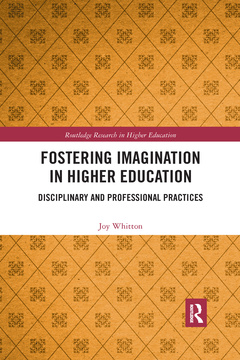Fostering Imagination in Higher Education Disciplinary and Professional Practices Routledge Research in Higher Education Series
Auteur : Whitton Joy

Imagination and creative teaching approaches are increasingly important across all higher education disciplines, not just the arts. Investigating the role of imagination in teaching and learning in non-arts disciplines, this book argues that a lack of clarity about what imagination looks like in higher education impedes teachers in fostering their students? creativity.
Fostering Imagination in Higher Education tells four ethnographic stories from physics, history, finance and pharmaceutical science courses, analytically observing the strategies educators use to encourage their students? imagination, and detailing how students experience learning when it is focussed on engaging their imagination. The highly original study is framed by Ricoeur?s work on different forms of imagination (reproductive and productive or generative). It links imaginative thinking to cognitive science and philosophy, in particular the work of Clark, Dennett and Polanyi, and to the mediating role of disciplinary concepts and social-cultural practices.
The author?s discussion of models, graphs, strategies and artefacts as tools for taking learners? thinking forward has much to offer understandings of pedagogy in higher education. Students in these case studies learned to create themselves as knowledge producers and professionals. It positioned them to experience actively the constructed nature of the knowledge and processes they were learning to use ? and the continuing potential of knowledge to be remade in the future. This is what makes imaginative thinking elemental to the goals of higher education.
Dedication
List of Figures and Tables
Chapter 1. Introduction
Chapter 2. Theoretical Framework on Imagination
Chapter 3. Theoretical Linking of Imagination with Cognition and Learning Theory
Chapter 4. Defining and Practising Creativity
Chapter 5. Honours Quantum Physics: Constituting Understanding by Combining Mindtools
Chapter 6. First Year Medieval History Ethnography: Mastering the Rules of Technique - The Conditions for Imaginative Creation
Chapter 7. Finance Ethnography
Chapter 8. Pharmaceutical Science Ethnography
Chapter 9. Conclusion
Joy Whitton is an academic developer at Monash University in Australia. Her research interests include imagination, cognition and their interplay with tools/artefacts and practices, and professional learning.
Date de parution : 08-2020
15.6x23.4 cm
Date de parution : 05-2018
15.6x23.4 cm
Thème de Fostering Imagination in Higher Education :
Mots-clés :
Ricoeur’s Theory; Ricoeur’s Notion; Imagination; Extended Mind; Creativity; Reproductive Imagination; Complexity; Predictive Processing Theory; Innovation; Semantic Innovation; Twenty-first century learners; Productive Imagination; Tool mediated learning; Extended Mind Theory; Extended cognition; Domain Relevant Skills; Scientific Inquiry Process; Ricoeur’s Terms; Pharmaceutical Science; Student Common Room; PP Model; Simulation Pedagogy; Young Man; Trading Session; Australian Research Intensive University; Vincent Van Gogh; Sine Wave Speech; Deposits Module; Mathematical Expression; PP; Quantised Radiation Field; Wim Blockmans



